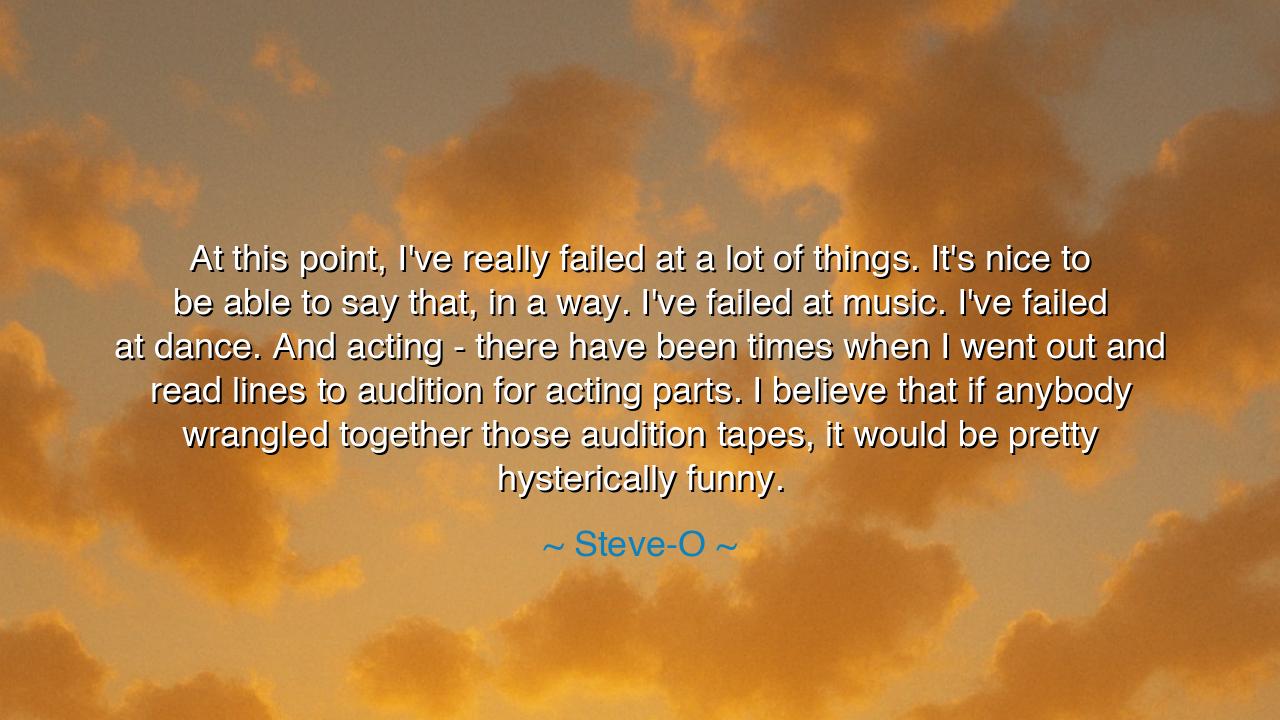
At this point, I've really failed at a lot of things. It's nice
At this point, I've really failed at a lot of things. It's nice to be able to say that, in a way. I've failed at music. I've failed at dance. And acting - there have been times when I went out and read lines to audition for acting parts. I believe that if anybody wrangled together those audition tapes, it would be pretty hysterically funny.






The jester-sage Steve-O, a man once known for wildness and absurdity, spoke with unexpected grace when he said: “At this point, I've really failed at a lot of things. It's nice to be able to say that, in a way. I've failed at music. I've failed at dance. And acting — there have been times when I went out and read lines to audition for acting parts. I believe that if anybody wrangled together those audition tapes, it would be pretty hysterically funny.” In these humble words, uttered with laughter, lies a wisdom older than kings — the understanding that failure, when embraced, becomes the foundation of wisdom, humor, and freedom.
To the casual listener, his tone may sound lighthearted, but beneath that laughter beats the heart of one who has walked through fire. Steve-O’s journey — from chaos and addiction to redemption and reflection — gives this quote its weight. When he speaks of failing, he speaks not in shame but in acceptance. He names his failures one by one — music, dance, acting — and yet there is no despair in his voice. There is only peace, even gratitude. For he has discovered the sacred paradox of growth: that to fail honestly is far nobler than to succeed falsely. To fall while striving is the mark of the living; to fear failure is the mark of the dead.
The ancients understood this well. The great inventor Thomas Edison, after thousands of failed attempts to create the lightbulb, famously said, “I have not failed. I’ve just found ten thousand ways that won’t work.” His words, like Steve-O’s, remind us that failure is not an ending but a refinement — a purification of the soul through effort and humility. The wise do not flee from failure; they collect it like teachers, each one revealing what is true and what is not. In the laughter Steve-O describes, we hear the sound of wisdom — the joy of a man who has stopped pretending to be perfect and has started to live truthfully.
There is also a quiet rebellion in his humor. In a world that worships perfection — where success is measured by applause and wealth — to celebrate failure is a radical act. Steve-O’s laughter becomes an act of liberation, freeing him from the tyranny of image and expectation. To laugh at oneself is to reclaim power from shame. It is to say, “Yes, I have fallen — but I stand taller because of it.” This humility does not diminish him; it ennobles him. It transforms humiliation into strength, embarrassment into empathy. Those who can laugh at their own weakness are, paradoxically, the strongest of all.
Consider the story of Abraham Lincoln, who failed in business, lost elections, and suffered deep personal sorrow before becoming one of history’s greatest leaders. His life teaches that failure is not the opposite of success but its companion. Without the courage to fail, one can never achieve greatness. Steve-O, too, has walked this path in his own way. Once bound by recklessness and self-destruction, he has risen through honesty and humor — turning his missteps into medicine for others. His “failed” auditions, his broken attempts at art — these are not stains on his legacy, but the brushstrokes that make his portrait human and whole.
In his words, there is also a lesson about humility and growth. To admit failure publicly, without bitterness, requires a soul that has transcended pride. It means one has come to see life not as a contest, but as a practice — a series of imperfect acts guided by perseverance and faith. The laughter he finds in those old audition tapes is the laughter of forgiveness, of wisdom looking back at youth and saying, “You tried. And that was enough.” Such laughter is not mockery, but healing. It transforms regret into lightness, and failure into art.
The lesson, then, is this: embrace your failures as sacred teachers. Do not hide them, nor curse them. Name them, laugh at them, and learn. For in every stumble lies a step toward self-understanding. The one who dares to fail is the one who dares to grow. Let your mistakes remind you that you are alive — that you dared to move, to dream, to reach. Those who fear failure remain frozen in mediocrity, but those who welcome it find truth. Failure, when faced with humility and humor, becomes the path to authenticity.
So, my child, remember Steve-O’s words. Do not measure your worth by how often you succeed, but by how bravely you attempt, how deeply you laugh, and how gently you forgive yourself. Let your failures be your teachers and your laughter be your crown. For life, like art, is not about perfection, but about presence — about showing up, trying, falling, and rising again. And in that rising, the soul shines brighter than any light of flawless success.






AAdministratorAdministrator
Welcome, honored guests. Please leave a comment, we will respond soon